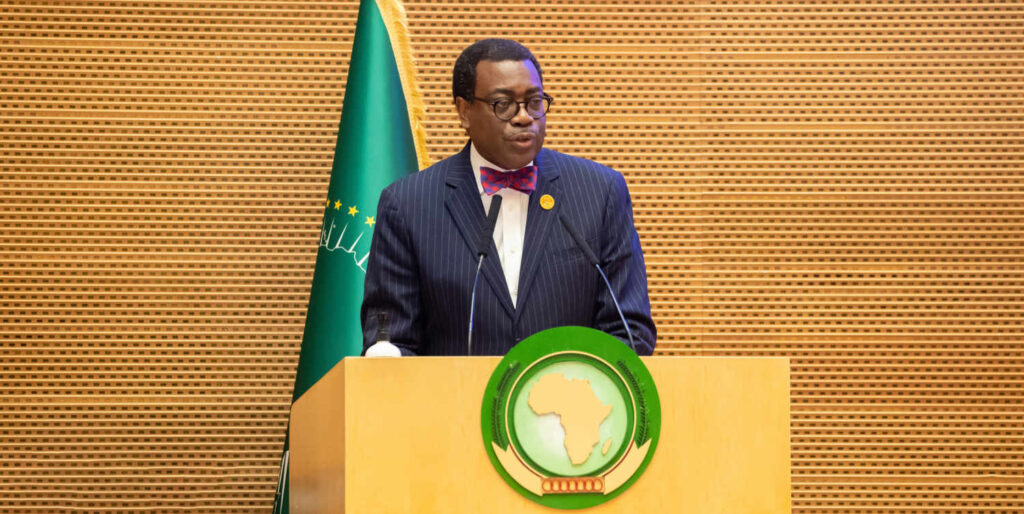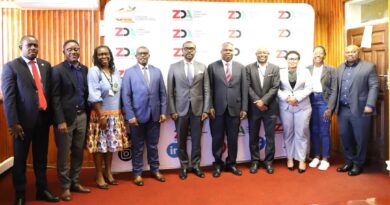African Union Summit: African Development Bank President Highlights a Decade of Economic Transformational Impact
African Development Bank Group President Dr. Akinwumi A. Adesina delivered a farewell address to Heads of State and Government at the 38th African Union Summit, reflecting on a decade of achievements by the Bank in driving Africa’s economic transformation.
The summit in Addis Ababa endorsed four Bank-led initiatives, including connecting 300 million Africans to electricity by 2030, measuring Africa’s green wealth as part of its GDP, a $20 billion financial buffer, and a roadmap for inclusive growth and sustainable development.
Adesina emphasized the impact of the Bank’s High 5s Agenda—Light up and Power Africa, Feed Africa, Industrialize Africa, Integrate Africa, and Improve the Quality of Life for the People of Africa—which has impacted more than half a billion lives across the continent.
During the final day of the assembly, African governments and AU officials paid tribute to Dr. Adesina for his leadership and advocacy for Africa. His tenure as the Bank Group’s president ends on September 1, 2025.
The February 15–16 Summit saw the election of Djibouti’s Foreign Minister Mahmoud Ali Youssouf as Chairperson of the African Union Commission, succeeding Moussa Faki Mahamat. Algeria’s Ambassador, Salma Malika Haddadi, was elected Deputy Chairperson.
Reflecting on his tenure, Dr. Adesina stated that the Bank has transformed 515 million lives, including 231 million women, over the past decade:
– 127 million people gained access to better health services.
– 61 million people gained access to clean water.
– 33 million people benefited from improved sanitation.
– 46 million people gained access to ICT services.
– 25 million people gained access to electricity.
He cited the Africa Energy Summit held in Tanzania in January, where 48 nations signed the Dar Es Salaam Declaration to extend electricity access to 300 million Africans by 2030. That meeting, attended by 21 heads of state, secured $48 billion in commitments from the World Bank and the African Development Bank, with an additional $7 billion from other development partners.
The Addis Ababa Summit endorsed the Dar Es Salaam Energy Declaration, the Baku Declaration on Measuring Africa’s Green Wealth, the African Financing Stability Mechanism, which provides $20 billion in debt refinancing, and the Strategic Framework for Achieving Inclusive Growth and Sustainable Development in Africa.
On food security, Adesina highlighted the Bank’s Technologies for African Agricultural Transformation (TAAT), the Dakar 2 Food Summit that mobilized $72 billion in 2023, and the $1.5 billion Africa Emergency Food Production Facility launched in May 2022. He noted that Ethiopia has achieved self-sufficiency in wheat production within four years and is now a wheat-exporting nation.
The Bank has also focused on job creation, training 1.7 million youth in digital skills and rolling out Youth Entrepreneurship Investment Banks to drive youth-led economic growth. The Affirmative Finance Action for Women in Africa (AFAWA) initiative has provided $2.5 billion in financing to over 24,000 women-owned businesses.
Over the past decade, the African Development Bank has invested over $55 billion in infrastructure, making it the largest multilateral financier of African infrastructure. It has committed $3 billion to quality healthcare infrastructure and another $3 billion for pharmaceutical development, including establishing the Africa Pharmaceutical Technology Foundation.
Under Adesina’s leadership, the Bank achieved its largest-ever capital increase, growing from $93 billion in 2015 to $318 billion. The most recent replenishment of the African Development Fund raised a record $8.9 billion for Africa’s 37 low-income countries, setting the stage for a target of $25 billion in the next replenishment.
The Africa Investment Forum, a joint effort with eight partner institutions, has mobilized over $200 billion in investment commitments, reinforcing Africa as a leading investment destination.
As he bid farewell, Adesina expressed gratitude to African Heads of State, the African Union Commission, regional economic communities, and the people of Africa for their support. He thanked leaders for their partnership in advancing the continent’s interests globally.
The 2025 Summit, themed “Justice for Africans and People of African Descent Through Reparations,” drew global political leaders, including UN Secretary-General António Guterres and Barbados Prime Minister Mia Mottley.
Guterres reiterated calls for reform of the international financial architecture, which he said hampers the development of African economies due to expensive debt repayments and high borrowing costs.
Mottley emphasized Africa’s strategic role in shaping global economic trends, highlighting its control of 40% of the world’s minerals. She called for eliminating transit visa requirements to boost trade and integration between Africa and the Caribbean.
Ethiopian Prime Minister Dr. Abiy Ahmed urged continued unity among member countries in addressing Africa’s challenges, emphasizing resilience and collective resolve in navigating global uncertainties.



